Seed saving is a practice whereby smallholder farmers save seeds from their own fields or rely on seeds supplied by their community (also called the ‘informal seed sector’) for the next season. In general, farmers are thought to use farm-saved seeds twice before considering purchasing new seeds again. This traditional system continues to form the basis of smallholder livelihoods as well as national food security in most index countries.
Although hybrids have become the commercial standard for an increasing number of crops because they generally produce better yields, on-farm seed saving relies on open-pollinated varieties as seed saved from hybrids tends to be less genetically stable and therefore less attractive for replanting.
The majority of the 62 companies explicitly allows the practice of farm-saved seeds by smallholder farmers, albeit subject to a few conditions. Regional companies in South and Southeast Asia and sub-Saharan Africa have different opinions about this traditional practice. Most of the companies operating in India report complying with the far-reaching policies regarding farm-saved seeds as stated in the country’s seed law. Companies in sub-Saharan Africa acknowledge the practice of farm-saved seeds, but some also express concern about the practice, arguing that it potentially hampers smallholder farmers’ productivity. As such, companies report activities to demonstrate to farmers the advantages of professionally produced seeds, such as distributing free samples or conducting field demonstrations, or programs to enhance farmers’ access to and use of improved seeds.
Most of the global companies allow the practice of farm-saved seeds if it is for private and non-commercial use. Few state that their position is compliant with the International Seed Federation (ISF) and Asia and Pacific Seed Association (APSA). The ISF states that for varieties or landraces that are not subject to intellectual property protection, ‘farmers have the right to save, use, exchange and sell farm-saved seed or propagating material subject to national law’. However, it notes that farm-saved seed of protected varieties has a negative impact on the release of new varieties and limits farmers’ choice16. APSA also affirms that the ‘farmers’ privilege’ can be extended to acts done privately and for non-commercial purposes, thereby safeguarding the ‘legitimate interests of the breeder’.
Although most companies do not block on-farm seed saving of their commercial varieties, a focus on developing hybrids as opposed to ensuring the availability of open-pollinated varieties effectively restricts the practice to a large extent. Only a few companies, notably in Africa, demonstrate tailored approaches to smallholder customers by offering a mix of hybrid and open-pollinated varieties. Since farmers are estimated to get 80-90% of their seeds from informal systems, with around half of that coming from local markets*, there are clearly opportunities for companies to make strategic interventions that improve the availability of and access to quality seeds in local markets, while respecting still ongoing informal seed exchanges of traditional varieties.
*S. McGuire, L. Sperling, Seed systems smallholder farmers use, 2015 (https://www.researchgate.net/publication/290963091_Seed_systems_smallholder_farmers_use)
.




